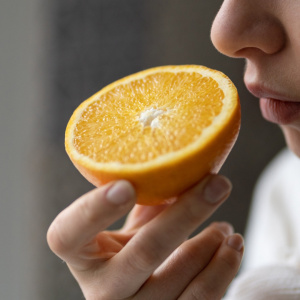Loss of Smell or Taste: What's Next?

Losing a sense, especially taste and smell -- both so intimately connected to the pleasure, selection and enjoyment of food, can be disorienting. The purpose of this blog is to briefly address what is known in regards to scientific evidence related to COVID-19 and its effects on these senses, how to address these concerns should one contract the illness and experience sensory disturbances and when it is appropriate to see a dietitian for help with these issues.
No Smell and/or Taste: How often does this happen?
At the time this article was written, here's what we know about COVID-19 and the effects it has had on some people with regards to loss of smell and taste:
- Six months after having COVID-19, about 5% of folks report having still suffered loss of smell and/or taste.
- Some studies suggest this is because the virus down regulates olfactory sensory cells (cells responsible for sensing smell)
- Three months after a COVID-19 infection, some people report that scents once pleasing to them smell bad and are disturbing. This condition is called parosmia.
Treatment for Loss of Smell and Taste
Because the situation is ever evolving, there is no consensus in regards to a protocol or plan to address loss of smell or taste. Research suggests that early intervention by way of olfactory training when loss is experienced leads to better outcomes1. Olfactory training involves exposure to strong smells for about 15 seconds twice a day for six months and is prescribed by a physician (usually an ear, nose and throat specialist).
Can a Dietitian Help?
In all cases related to sensory dysfunction and COVID-19, a physician should be directing and involved in the care of the person experiencing the smell and/or taste loss. A dietitian can help address secondary issues that arise from smell and taste loss, such as:
- food aversions and selecting nutritious substitutes
- weight loss (specifically related to eating less)
- supplementation recommendations in conjunction with a physician's oversight
What to do in the short term?
If you are experiencing loss of smell or taste, prioritize eating with a few strategies below:
- Consider eating cold foods or chilled foods like smoothies, pudding and yogurt. Some report this is more appetizing than hot foods.
- Make colorful additions to your plate with vegetables and fruits that are packed with nutritious antioxidants.
- Dry mouth can contribute to loss of taste--if you are experiencing dry mouth, try beginning a meal with sour tastes like a squeeze of lemon or lime juice or sorbet.
- Consider adding various textures to your meals, to experience pleasure in other ways such as adding chewy, crunchy, or smooth textures to familiar foods that you enjoy eating.
References:
1. Prognosis and persistence of smell and taste dysfunction in patients with covid-19: meta-analysis with parametric cure modelling of recovery curves. BMJ2022;378:e069503

 RSS Feed
RSS Feed